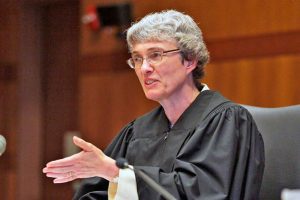
Superior Court Judge Mary Jacobson
Superior Court judge signals that a swift resolution is unlikely, encourages negotiations with state.
It may soon go down in the lexicon of New Jersey’s most famous equity court cases: Latino Action Network v. State of New Jersey.
Right up there with the Abbott v. Burke school finance case and Mt. Laurel’s affordable housing rulings, the nascent school segregation lawsuit brought by the Latino rights group and others opened in earnest in a Trenton courtroom on Friday.
And after close to 90 minutes of mostly procedural arguments and exchanges, state Superior Court Judge Mary Jacobson sent a clear message that this is one of those epic cases that could take a while.
The statistics are clear and “indisputable,” she said, with New Jersey’s public schools among the most racially segregated in the country. See your district’s enrollment breakdowns here.
Finding solutions is the hard part, with the state collectively throwing up its hands at the problem for decades — even as the court and others have stepped in over the years in settling desegregation cases in individual districts like Plainfield, Englewood and Morristown.
Jacobson, in her closing remarks, spoke to the enormity and “far-reaching” nature of the case before her. And she left with an admonition, before adjourning to what will likely be months of discovery and years of potential trials and appeals.
“I would encourage you to go back to the negotiation table,” Jacobson said to the half-dozen attorneys before her.
Preparing for long haul
“You gave up [on previous settlement talks], I think there were good-faith efforts, and I’m not going to push you to mediation,” she said. “But I just would say the plaintiffs are very intent on moving as quickly as possible, and to not engage the state after you have heard these arguments and heard some of my concerns, I think it might be shortsighted. I would just encourage it.”
Short of that, buckle up — as schedules were ordered for exchanging evidence, supplying experts, and preparing for the long haul.
“This is a court that understands that what is before them is a truly momentous case,” said Lawrence Lustberg, lead attorney for the plaintiffs, when talking to reporters afterward. “And it is reluctant to decide this case under anything but a full record.
“This type of litigation always takes a long time,” he continued. “Even if the litigation itself resolves quickly, often the monitoring period and the execution of whatever agreement can take decades….But we at least can get the process moving forward more quickly than that.”
Before the court on Friday were procedural motions from each party to have Jacobson make a summary judgment to either dismiss the case outright or to rule in the plaintiffs’ favor, neither of which were expected.
A significant moment
The much-anticipated oral arguments were the first opportunity for each side to make their over-arching cases to not just the court, but also the public. And the significance of the moment was not lost.
In the Trenton courtroom were some of the deans of equity law in New Jersey, including former Supreme Court justice Gary Stein, Education Law Center founder Paul Tractenberg, and Ryan Haygood of the New Jersey Institute for Social Justice.
Arguing for the plaintiffs was Lustberg, who himself cut his legal teeth as an intern on the first Abbott v. Burke case back in the 1980s. “That’s how old I am,” he quipped afterward.
The state’s position was an awkward one, as Gov. Phil Murphy has generally said racial segregation in schools is an unacceptable condition that the state needs to address.
Yet while opening that the segregation is indeed a problem, the state’s lawyer, Assistant Attorney General Melissa Schaffer, largely pressed the case that the plaintiffs were blaming the wrong party and that school districts should also be subject to the litigation. One of the state’s motions was to join all of New Jersey’s nearly 600 districts into the deliberations.
“The action cannot continue without the participation of each of the state’s individual school districts, who have a real and substantial interest in the disposition of this case,” Schaffer said in a recurring theme of her arguments.
Lustberg responded — and Jacobson ultimately agreed — that requiring hundreds of districts to be part of the case would be untenable and unnecessary in such a case involving statewide constitutional rights.
More school districts
Nonetheless, Jacobson did say in her final ruling that more should be done to at least invite districts in, going so far as to draft a letter to the districts to respond by late March.
“I am concerned that we don’t have any school districts here,” the judge said from the bench. “It would certainly broaden what would be put before the court.”
Even with the overwhelming numbers that show the extent of segregation, Jacobson said she would be open to hear arguments that put those numbers in context.
“I have to look at the circumstances of those statistics,” she said. “You will not get to remedy unless you first determine liability.”
And in one comment about the discovery process that maybe spoke to the uncertainty of the case as a whole, the judge said the outcome is tough to predict.
“I’m not sure where it is going to go,” Jacobson said.
Click here to read full story at www.njspotlight.com.